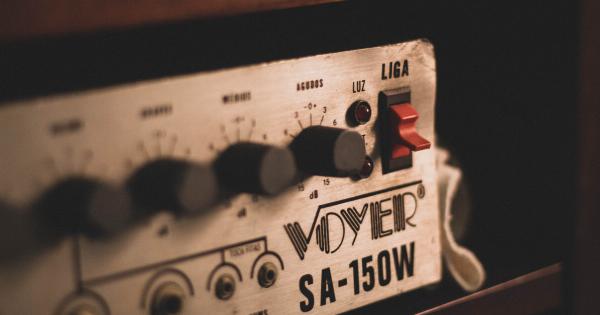Cancer is a devastating disease that affects millions of people around the world. It not only takes a toll on physical health but also on emotional well-being.
In the face of such a challenging diagnosis, finding effective ways to support patients in their journey is crucial. One powerful tool that has shown great potential in cancer care is music therapy.
What is Music Therapy?
Music therapy is a holistic approach that uses music to address physical, emotional, cognitive, and social needs of individuals. It involves the use of various musical elements such as rhythm, melody, and harmony to create a therapeutic environment.
Trained music therapists work with patients, tailoring their interventions to meet specific needs and goals.
The Impact of Music on Cancer Patients
The power of music in cancer care is undeniable. Research has shown that music therapy can have a positive impact on patients dealing with cancer in several ways:.
1. Pain Management
Listening to music has been found to reduce pain perception in cancer patients. It activates areas of the brain associated with pleasure and distracts the mind from pain stimuli.
Music therapy can be particularly valuable for patients undergoing procedures, such as chemotherapy or radiation therapy, where pain and discomfort are common.
2. Stress and Anxiety Reduction
A cancer diagnosis often leads to high levels of stress and anxiety. Music has the ability to lower stress hormones, such as cortisol, and induce relaxation.
It can provide a sense of comfort and emotional support, alleviating anxiety and helping patients cope with the emotional challenges of their condition.
3. Mood Enhancement
Music has a profound impact on emotions. It can evoke memories, trigger positive feelings, and bring joy to patients’ lives.
Listening to uplifting and favorite songs can boost mood and increase feelings of happiness, even in the midst of difficult circumstances.
4. Quality of Life Improvement
Living with cancer can greatly affect a person’s quality of life. Music therapy offers a non-pharmacological and non-invasive approach to improving overall well-being.
It helps patients maintain a sense of normalcy, promotes self-expression, and provides a form of escapism from the challenges of their illness.
5. Communication and Expression
For some cancer patients, verbal communication may be difficult or limited due to various treatment side effects. Music therapy provides an alternative form of communication and expression.
Through music, patients can express their emotions, fears, and hopes without the need for words. It can facilitate emotional release and connection with others.
6. Support for Caregivers
Caregivers, who play a vital role in supporting cancer patients, also undergo immense emotional and physical strain. Music therapy can benefit them as well, providing relaxation, stress reduction, and emotional support.
It can help improve the caregiver-patient relationship and create a more positive caregiving environment.
7. Promotion of Resilience
Music has the power to inspire and motivate. Engaging in music therapy sessions, whether through listening or playing instruments, can foster a sense of resilience in cancer patients.
It encourages them to face challenges head-on, instilling hope, and the belief in their ability to overcome obstacles.
Music Therapy Approaches in Cancer Care
There are several approaches to music therapy that can be applied in the context of cancer care:.
1. Active Music Making
Patients actively participate in creating music by singing, playing instruments, or composing songs. This approach allows for self-expression and can enhance feelings of empowerment and self-esteem.
2. Receptive Music Listening
In this approach, patients listen to pre-recorded or live music selected by the music therapist. Listening to soothing or personally meaningful music can aid relaxation, reduce anxiety, and provide comfort.
3. Lyric Analysis
Through the analysis of song lyrics, patients can explore and reflect on their own experiences, emotions, and challenges. This approach promotes self-awareness and can serve as a catalyst for discussions and emotional processing.
4. Music-Assisted Relaxation
Guided relaxation exercises accompanied by calming music can help patients manage stress, induce a state of relaxation, and improve sleep quality. This approach combines the benefits of music and relaxation techniques.
The Future of Music in Cancer Care
As the potential of music therapy becomes increasingly recognized in cancer care, further research is being conducted to validate its benefits and identify the most effective methods of implementation.
With advancements in technology, music therapy is becoming more accessible to cancer patients. Mobile applications, streaming services, and virtual platforms allow individuals to engage in music therapy from the comfort of their own homes.
This widens the reach of music therapy, particularly for patients who may face mobility or travel limitations.
Conclusion
Music has a remarkable ability to touch our souls and promote healing. It is a powerful tool in cancer care, offering numerous benefits to patients and their caregivers.
The integration of music therapy into standard cancer treatment protocols has the potential to enhance overall well-being, improve the quality of life, and provide much-needed emotional support. By harnessing the power of music, we can create a more compassionate and effective approach to cancer care.

























